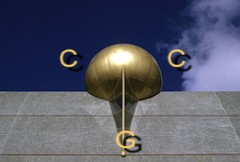 |
| Rtd. General Muhammadu Buhari |
FORMER Military Dictator and Presidential Candidate of the Congress for Progressive Change (CPC), Gen. Muhammadu Buhari, has said unless transparency and justice characterized the conduct of the 2015 general elections, a bloody dispute might erupt within the country's political class.
Buhari, a strong proponent of Sharia Law, who has also built a reputation for making unguarded and often inflammatory statements, stated this when he received a delegation of CPC members from Niger State in his Kaduna office.
He stressed that only the election of credible politicians into public offices would rescue the nation from the current mess.
Buhari stated: "God willing by 2015, something will happen. They either conduct a free and fair election or they go in a very violent and disgraceful way".
On the question of whether he would run in 2015 presidential election or not, Buhari said the CPC leaders should organise themselves first while he reconsidered his position as to whether he will contest or not.
Buhari also spoke on the security challenges in the country, noting: "The North is not silent. It only incapacitated because the North does not own the police, soldiers or Central Bank of Nigeria. Since the leaders now don't listen to anybody but do whatever they wish, there is nothing the North can do.
"I will like to quote Prof. Ango Abdullahi who said there are three Boko Harams, including the original one led by Muhammed Yusufu who was killed and his supporters tried to take revenge in attacking the law enforcement agencies and politicians. There is another developed Boko Haram of criminals who steal and kill while the biggest Boko Haram is the Federal Government".
The Presidential Candidate of the CPC in the April 2011 elections also spoke on the fuel subsidy probe in the country, saying that the current leadership of the country has destroyed the petroleum industry.
His words: "These things can only happen under Nigeria's current leadership. Nowhere in the world can such things happen now and nowhere in the world can government increase the cost of petroleum products with more than 120 per cent. It is most insensitive. Besides the air people breath, the next important thing to them is petroleum products."
"Unfortunately for me, I know more about the petroleum industry than others in government because I was there for over three years as a leader. We started with Port-Harcourt refinery producing 60,000 barrels per day, it was upgraded to 100,000 barrels per day. Another one was built there also in Port Harcourt producing over 150,000 barrels, making a total of 250,000 barrels per day strictly to refine Nigerian crude for local consumption."














